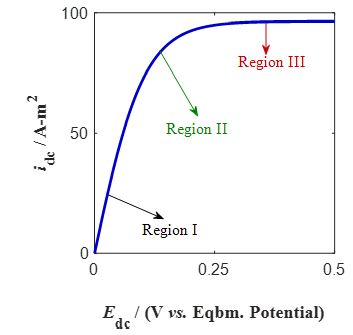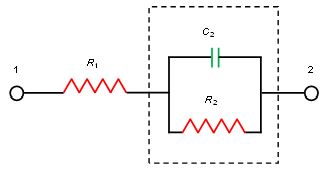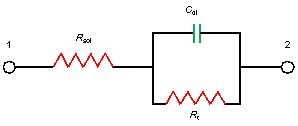Deck 1: Introduction
Question
Question
Question
Question
Question
Question
Question
Question
Question
Question
Question
Question
Question
Question
Question
Question
Question
Question
Question
Question
Question

Unlock Deck
Sign up to unlock the cards in this deck!
Unlock Deck
Unlock Deck
1/21
Play
Full screen (f)
Deck 1: Introduction
1
In an electrochemical reaction, the change in Gibbs free energy ( G) is related to the potential drop across the electrode-electrolyte interface
A) linearly
B) exponentially
C) logarithmically
D) none of the above
A) linearly
B) exponentially
C) logarithmically
D) none of the above
linearly
2
As the potential is changed, the rate constant of a chemical reaction
A) changes linearly
B) changes quadratically
C) does not change at all
D) changes exponentially
A) changes linearly
B) changes quadratically
C) does not change at all
D) changes exponentially
D
3
When the concentration of ions in solution is very low, (< 1 mM) Helmholtz model offers a better description of the double layer capacitor.
False
4
For a capacitor with a certain capacitance (C), the relationship between current(i) and potential (E) in time (t) domain is given by
A)
B)
C)
D)
A)
B)
C)
D)

Unlock Deck
Unlock for access to all 21 flashcards in this deck.
Unlock Deck
k this deck
5
If a metal, such as Cu, is used as a working electrode, and another piece of the same metal is used as a reference electrode, then any potential applied is evenly divided between the working and reference electrode.

Unlock Deck
Unlock for access to all 21 flashcards in this deck.
Unlock Deck
k this deck
6
Given
, if a sinusoidal potential of angular frequency ( ) is applied, then the impedance of an inductor with an inductance (L Henry) is given in complex notation as
A)
B)
C)
D)
, if a sinusoidal potential of angular frequency ( ) is applied, then the impedance of an inductor with an inductance (L Henry) is given in complex notation as
A)
B)
C)
D)

Unlock Deck
Unlock for access to all 21 flashcards in this deck.
Unlock Deck
k this deck
7
A three-electrode system is used in lab experiments so that
A) load is divided evenly between all electrodes
B) potential change across working electrode can be controlled
C) potential at the counter electrode is fixed
D) current at the working electrode is fixed
A) load is divided evenly between all electrodes
B) potential change across working electrode can be controlled
C) potential at the counter electrode is fixed
D) current at the working electrode is fixed

Unlock Deck
Unlock for access to all 21 flashcards in this deck.
Unlock Deck
k this deck
8
The role of supporting electrolyte is to
A) support the electrochemical cell
B) increase the effective area of the working electrode
C) decrease reference electrode impedance
D) decrease solution resistance
A) support the electrochemical cell
B) increase the effective area of the working electrode
C) decrease reference electrode impedance
D) decrease solution resistance

Unlock Deck
Unlock for access to all 21 flashcards in this deck.
Unlock Deck
k this deck
9
The impedance of an ideal inductor will have a phase of
A) 0 °
B) -90 °
C) +90 °
D) 180 °
A) 0 °
B) -90 °
C) +90 °
D) 180 °

Unlock Deck
Unlock for access to all 21 flashcards in this deck.
Unlock Deck
k this deck
10
An inductor of inductance (L) and a capacitor of capacitance (c) are connected in series. The net impedance of this circuit is
A)
B)
C)
D)
A)
B)
C)
D)

Unlock Deck
Unlock for access to all 21 flashcards in this deck.
Unlock Deck
k this deck
11
An ideal reference electrode is polarizable.

Unlock Deck
Unlock for access to all 21 flashcards in this deck.
Unlock Deck
k this deck
12
Given
, if a sinusoidal potential of angular frequency ( ) is applied, then the admittance of a capacitor with capacitance (C Farad) is given in complex notation as
A)
B)
C)
D)
, if a sinusoidal potential of angular frequency ( ) is applied, then the admittance of a capacitor with capacitance (C Farad) is given in complex notation as
A)
B)
C)
D)

Unlock Deck
Unlock for access to all 21 flashcards in this deck.
Unlock Deck
k this deck
13
For an ideal reference electrode, the impedance should be very large.

Unlock Deck
Unlock for access to all 21 flashcards in this deck.
Unlock Deck
k this deck
14
In the potentiodynamic polarization data of a simple electron transfer reaction (Fig. below), region (II) is 
A) kinetic limited
B) mixed control region
C) diffusion-limited
D) adsorption limited.

A) kinetic limited
B) mixed control region
C) diffusion-limited
D) adsorption limited.

Unlock Deck
Unlock for access to all 21 flashcards in this deck.
Unlock Deck
k this deck
15
Consider an electrical circuit shown below.
 For a given value of R1, R2, and C2, the impedance at a wide range of frequencies can be calculated and plotted as a complex plane plot and Bode plots. If the capacitance C2 is changed,
For a given value of R1, R2, and C2, the impedance at a wide range of frequencies can be calculated and plotted as a complex plane plot and Bode plots. If the capacitance C2 is changed,
A) Shape of the complex plane plot will remain the same, but the points will move in the same curve
B) location of the peak in phase vs. frequency will change
C) both of the above
D) none of the above
 For a given value of R1, R2, and C2, the impedance at a wide range of frequencies can be calculated and plotted as a complex plane plot and Bode plots. If the capacitance C2 is changed,
For a given value of R1, R2, and C2, the impedance at a wide range of frequencies can be calculated and plotted as a complex plane plot and Bode plots. If the capacitance C2 is changed,A) Shape of the complex plane plot will remain the same, but the points will move in the same curve
B) location of the peak in phase vs. frequency will change
C) both of the above
D) none of the above

Unlock Deck
Unlock for access to all 21 flashcards in this deck.
Unlock Deck
k this deck
16
In chrono amperometry, ____________ is measured as a function of _____________

Unlock Deck
Unlock for access to all 21 flashcards in this deck.
Unlock Deck
k this deck
17
Consider three resistors, R1 = 150 , R2 = 200 and R3 = 250 . When they are connected in series, the net impedance is (i)__________ and when they are connected in parallel, the net impedance is (ii)___________

Unlock Deck
Unlock for access to all 21 flashcards in this deck.
Unlock Deck
k this deck
18
A resistor with resistance (R) is connected in parallel with an inductor with an inductance (L). The net impedance of the circuit is given by
A)
,
B)
C)
D)
A)
,
B)
C)
D)

Unlock Deck
Unlock for access to all 21 flashcards in this deck.
Unlock Deck
k this deck
19
The impedance of an ideal capacitor will have a phase of
A) 0 °
B) -90 °
C) +90 °
D) 180 °
A) 0 °
B) -90 °
C) +90 °
D) 180 °

Unlock Deck
Unlock for access to all 21 flashcards in this deck.
Unlock Deck
k this deck
20
Using the circuit given below, calculate the impedance at a frequency of 10-5 Hz. Here, Rsol = 10 , Rt = 100 , Cdl = 10 F. Round the impedance values to one decimal. ZRe = (i) __________ and ZIm = (ii) ___________ .



Unlock Deck
Unlock for access to all 21 flashcards in this deck.
Unlock Deck
k this deck
21
During the measurement of open circuit potential as a function of time, the counter electrode need not be connected.

Unlock Deck
Unlock for access to all 21 flashcards in this deck.
Unlock Deck
k this deck



